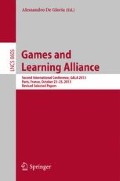Abstract
Massive Open Online Courses (MOOC) are becoming a game changer in the field of Higher Education and lifelong learning. However, the MOOC pedagogical model is almost exclusively a reproduction of the lecture-oriented approach. We introduce a Game-Based Learning approach in a MOOC that aims to encourage entrepreneurship through the use of Serious Games (SG). In this study, we analyse the entrepreneurship skills developed in a Game-Based Learning MOOC (GBL MOOC) according to five assessed activities developed during the course: presentation and participation in a general debate; an entrepreneurial aptitude test; the Metavals SG; the Hot Shot Business SG; and a final questionnaire. The results of the final questionnaire show a good perception of the utility of the GBL MOOC for entrepreneurship studies, and an acceptable overall degree of satisfaction with the use of SGs during the MOOC.
Access this chapter
Tax calculation will be finalised at checkout
Purchases are for personal use only
References
Mallon, M.E.: MOOCs. Public Serv. Q. 9(1), 46–53 (2013)
Cooper, S., Sahami, M.: Reflections on Stanford’s MOOCs. Commun. ACM 56(2), 28 (2013)
Little, B.: You MOOC, iMOOC. Train. J. 5, 19–22 (2013)
Padrós, A., Romero, M., Usart, M.: Developing serious Games: Form Face-to-Face to a Computer-based Modality, vol. 25. E-learning papers (2011)
Everett, J.: Building a business simulation for kids. Comput. Entertainment 1(1), 1–18 (2003)
Berglann, H., Moen, E., Roed, K., Skogstrom, J.F.: Entrepreneurship: Origins and returns. Labour Econ. 18, 180–193 (2011)
May, R.: The Courage to Create, p. 37. Norton, New York (1975)
Bygrave, W.D., Hofer, C.W.: Theorizing about entrepreneurship. Entrepreneurship Theor. Pract. (p. 14) 16(2), 13–22 (1991)
Lathi, R.K.: Identifying and integrating individual level and organizational level core competencies. J. Bus. Psychol. 14(1), 59–75 (1999)
Schmitt-Rodermund, E.: Pathways to successful entrepreneurship: parenting, personality, early entrepreneurial competence, and interests. J. Vocat. Behav. 65(3), 498–518 (2004)
Leadbeater, C., Goss, S.: Civic Entrepreneurship. Demos and Public Management Foundation, London (1998)
Lazear, E.: Balanced skills and entrepreneurship. Am. Econ. Rev. Pap. Proc. 94, 208–211 (2004)
Gibb, A.: The future of entrepreneurship education – determining the basis for coherent policy and practice? In: Kyrö, P., Carrier, C. (eds.) The Dynamics of Learning Entrepreneurship in a Cross-Cultural University Context. Research Centre for Vocational and Professional Education, University of Tampere, Tampere (1995)
Gonczi, A., Hager, P.: The competency model. In: Peterson, P., Baker, E., McGaw, B. (eds.) International Encyclopedia of Education, pp. 403–410. Elsevier, Oxford (2010)
Rae, D.: Understanding entrepreneurial learning: a question of how? Int. J. Entrepreneurial Behav. Res. 6(3), 145–159 (2000)
Sadigh, D., Seshia, S.A., Gupta, M.: Automating exercise generation: a step towards seeting the MOOC challenge for embedded systems. In: Workshop on Embedded Systems Education (WESE), Tampere, Finland. ACM (2012)
Deterding, S., Dixon, D., Khaled, R., Nacke, L.: From game design elements to gamefulness: defining gamification. In: Proceedings of the 15th International Academic MindTrek Conference: Envisioning Future Media Environments (p. 9), pp. 9–15. ACM (2011)
Cubico, S., Bortolani, E., Favretto, G., Sartori, R.: Describing the entrepreneurial profile: the entrepreneurial aptitude test (TAI). Int. J. Entrepreneurship Small Bus. 11(4), 424–435 (2012)
Nab, J., Pilot, A., Brinkkemper, S., Berge, H.T.: Authentic competence-based learning in university education in entrepreneurship. Int. J. Entrepreneurship Small Bus. 9(1), 20–35 (2010)
Fishman, B.J., Deterding, S.: Beyond Badges & Points: Gameful Assessment Systems for Engagement in Formal Education, University of Wisconsin, Wisconsin, Madison (2013)
Sheldon, L.: The Multiplayer Classroom: Designing Coursework as a Game. Cengage Learning, Boston (2011)
Romero, M., Usart, M., Ott, M., Earp, J.: Learning through playing for or against each other? promoting collaborative learning in digital game based learning. In: ECIS 2012 Proceedings, Paper 93. http://aisel.aisnet.org/ecis2012/93, ISBN: 9788488971548
Romero, M.: Game Based Learning MOOC. Promoting Entrepreneurship Education. Elearning papers, no. 33, pp. 1–5 (2013)
Mawdesley, M., Long, G., Al-Jibouri, S., Scott, D.: The enhancement of simulation based learning exercises through formalised reflection, focus groups and group presentation. Comput. Educ. 56(1), 44–52 (2011)
Romero, M., Usart, M., Todeschini, T.: A serious game for individual and cooperative learning activities, serious game classification (2011). http://serious.gameclassification.com/EN/games/18150-MetaVals/index.html
Brennan, M., Wall, A., McGowan, P.: Academic entrepreneurship: Assessing preferences in nascent entrepreneurs. J. Small Bus. Enterp. Dev. 12(3), 307–322 (2005)
Kuratko, D.F.: The emergence of entrepreneurship education: development, trends, and challenges. Entrepreneurship Theor. Pract. 29(5), 577–598 (2005)
Guetl, C., Pirker, J.: Implementation and evaluation of a collaborative learning, training and networking environment for start-up entrepreneurs in virtual 3D worlds. School of Information Systems, Curtin University (2011)
Driessen, M.P., Zwart, P.S.: The role of the entrepreneur in small business success: the entrepreneurship scan. Working paper, University of Groningen (1999)
Acknowledgements
This study has been developed in the context of the Network of Excellence Games and Learning Alliance (GaLA) and the Erasmus Project “Stimulating Entrepreneurship through Serious Games” (eSG) funded from the European Community’s Seventh Framework Programme (FP7/2007-2013).
Author information
Authors and Affiliations
Corresponding author
Editor information
Editors and Affiliations
Rights and permissions
Copyright information
© 2014 Springer International Publishing Switzerland
About this paper
Cite this paper
Usart, M., Romero, M. (2014). Entrepreneurship Competence Assessment Through a Game Based Learning MOOC. In: De Gloria, A. (eds) Games and Learning Alliance. GALA 2013. Lecture Notes in Computer Science(), vol 8605. Springer, Cham. https://doi.org/10.1007/978-3-319-12157-4_20
Download citation
DOI: https://doi.org/10.1007/978-3-319-12157-4_20
Published:
Publisher Name: Springer, Cham
Print ISBN: 978-3-319-12156-7
Online ISBN: 978-3-319-12157-4
eBook Packages: Computer ScienceComputer Science (R0)

